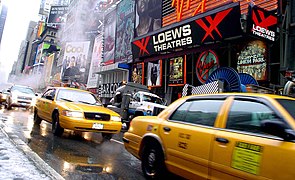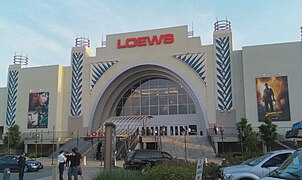Loews Cineplex Entertainment
This article has multiple issues. Please help or discuss these issues on the talk page. (Learn how and when to remove these template messages)
|
 | |
| Formerly | Loews Incorporated Sony Theatres (1994–1996) Loews Cineplex Entertainment Corporation (1998–2002) |
|---|---|
| Type | Private (1904–1998) Public (1998–2004) |
| Industry | Entertainment (movie theatres) |
| Predecessors |
|
| Founded | June 23, 1904 (original) May 14, 1998 |
| Founder | Marcus Loew |
| Defunct | January 26, 2006 |
| Fate | Merged into AMC Theatres (Canadian operations merged into Cineplex Entertainment) |
| Successors | |
| Headquarters | 711 Fifth Avenue New York City, New York 10022, US 1303 Yonge Street Toronto, Ontario, Canada M4T 2Y9 |
Areas served | North America, South Korea, Spain |
Key people | Lawrence J. Ruisi (President and CEO) Allen Karp (Chairman and CEO, Cineplex Odeon Corp.) |
| Owner | Loews Corporation (1959–1985) Perenchio Pictures (1985–1986) Tri-Star Pictures (1986–1987) Sony Pictures Entertainment (1987–2002) Universal Studios (1998–2002) Onex Corporation (2002–2004) |
| Divisions | Loews Theatres Cineplex Odeon Cinemas Magic Johnson Theatres Star Theatres |
| Subsidiaries | Cineplex Odeon Corporation Cinemex MEGABOX |
| Website | amctheatres cineplex |
Loews Cineplex Entertainment, also known as Loews Incorporated, founded on June 23, 1904 by Marcus Loew, was the oldest theater chain operating in North America. From 1924 until 1959, it was also the parent company of Metro-Goldwyn-Mayer Studios (MGM).
The company was originally called "Loew's," after the founder, Marcus Loew. In 1969, when the Tisch brothers acquired the company, it became known as "Loews." The company merged with Canadian-based Cineplex Odeon Corporation in 1998 only to become bankrupt in 2001. The company merged with AMC Theatres on January 26, 2006, while the Canadian operations merged with Cineplex Galaxy in 2003.
The Loews Theatres name was used until 2017, when AMC simplified their branding to focus on three main lines: AMC, AMC Classic and AMC Dine-In after their purchase of Carmike Cinemas. Prior to the discontinuation, Loews Cineplex operated its theatres under the Loews Theatres, Cineplex Odeon, Star Theatres and Magic Johnson Theatres brands. Its corporate offices were located in New York and Toronto.
History[]

Loew's Theatres Incorporated was formed in 1904 in Cincinnati, Ohio, by entrepreneur Marcus Loew. Loew founded a chain of nickelodeon theaters which showed short silent films in storefront locations. Soon the successful enterprise grew to include deluxe vaudeville houses and finally lavish movie palaces. Loew's theaters were found in cities from coast-to-coast, but primarily in East Coast and Midwest states.
To provide quality films for his theaters, Loew founded Metro-Goldwyn-Mayer Pictures (MGM) in 1924, by merging the earlier firms Metro Pictures, Goldwyn Pictures, and Louis B. Mayer Productions. Loew's Incorporated served as distribution arm and parent company for the studio until the two were forced to separate by the 1948 US Supreme Court ruling United States v. Paramount Pictures, Inc. The two companies officially split in 1959.
Loews Corporation, the successor company to the original firm founded by Marcus Loew, announced on April 9, 1985 that it was negotiating to sell Loews Theatres to a group headed by A. Jerrold Perenchio.[1][2][3] Loews Corporation by this time was a holding company owned by brothers Robert and Laurence Tisch highly diversified in non-entertainment business interests ranging from hotels to insurance. Perenchio completed the acquisition for $160 million on July 11.[4]
On October 20, 1986, when federal regulations had been relaxed, Tri-Star Pictures, then a joint venture co-owned by The Coca-Cola Company (also owners of Columbia Pictures at the time) and Time Inc.'s HBO, entered an agreement to acquire Loews Theatre Management Corporation for $300 million; Tri-Star closed the acquisition in December.[5][6][7] HBO left Tri-Star, which merged with Columbia Pictures in 1987, resulting in the formation of Columbia Pictures Entertainment. On May 26, 1987, Tri-Star said it planned to double the 300-screen chain's size over the next year and a half through acquisitions and constructing new theaters.[8] On January 25, 1988, Columbia agreed to acquire USA Cinemas Inc., with 325 screens, for $165 million; the acquisition was closed on March 2.[9] Later in 1988, Loews bought 48 screens in the Washington, D.C. area from Roth Enterprises, M&R Theatres with 70 screens in the Chicago area, and JF Theatres, Inc. with 66 screens in the Baltimore area.[10][11][12] Upon the full acquisition of Tri-Star by Columbia Pictures, and when Columbia Pictures Entertainment was bought from Coca-Cola by Sony in 1989, Sony inherited the theaters.
On April 19, 1994, Loews announced it would change its name to Sony Theatres.[13] On April 27, Sony partnered with basketball player Magic Johnson to form Magic Johnson Theaters, a mini-chain of theaters specifically geared toward the inner cities, particularly in Los Angeles.[14] A year before, Sony Dynamic Digital Sound was installed in several theaters, since the parent company used it to promote Sony's cinema sound division, which eventually shut down in 2002. Sony Theatres began reverting back to the Loews Theatres name in October 1996.
In 1998, Cineplex Odeon Corporation merged with Loews Theaters to form Loews Cineplex Entertainment. The combined company was one of the largest movie exhibitors in the world, with theaters in the United States, Canada, Mexico, South Korea, and Spain. The company was forced to sell of its newly acquired subsidiary, Cineplex Odeon Films, to Alliance Atlantis, which was formed from the merger of Alliance Entertainment Coporation and Atlantis Communications that year.[15] In 2001, though, the company declared Chapter 11 bankruptcy.
In 2002, Onex Corporation and Oaktree Capital Management acquired Loews Cineplex and the company was filed for initial public offering (IPO).[16][17] In 2004, they sold Loews to a private group of investors which included the Carlyle Group.[18] Onex retained the Canadian Loews Cineplex and merged it with Galaxy Cinemas to form Cineplex Galaxy Income Fund.
In 2005, AMC Theatres announced that it would merge with Loews Cineplex Entertainment and that the merged company would adopt the AMC name.[19] At the time of the merger, Loews operated 198 theaters with 2,235 screens. Many theaters were rebranded as AMC Loews, until the Loews name was phased out in 2017.
Gallery[]

Loews Theatre, Times Square, New York City, 2005

Loews Theatre in Harvard Square, Cambridge, Massachusetts, 2007

Loews Alderwood 16 in Lynnwood, Washington, opened in March 2005 before the merger with AMC Theatres

Cinéma Cineplex Odeon in Sainte-Foy, Quebec, was one of the Cineplex Odeon-branded theatres built by Loews Cineplex in Canada in the early 2000s prior to its merger by Galaxy Cinemas
See also[]
- Loew's Wonder Theaters
- United States v. Loew's Inc., a 1962 Supreme Court decision on block booking
- Cineplex Entertainment
References[]
- ^ "Perenchio Seeks to Buy Loews' Theater Chain". Los Angeles Times. April 9, 1985. Retrieved December 9, 2021.
- ^ "Loew's Negotiating to Sell Theaters". The New York Times. April 9, 1985. Retrieved December 9, 2021.
- ^ "Loews trying to sell its movie theater chain". United Press International. April 9, 1985. Retrieved December 9, 2021.
- ^ "Loews Unit Sold". The New York Times. July 11, 1985. Retrieved December 9, 2021.
- ^ "COMPANY NEWS; Tri-Star Pictures". The New York Times. October 21, 1986. Retrieved December 9, 2021.
- ^ "Tri-Star Pictures to acquire theater chain". United Press International. October 20, 1986. Retrieved December 9, 2021.
- ^ "THEATER CHAIN EYES TOP". Chicago Tribune. October 22, 1986. Retrieved December 9, 2021.
- ^ "COMPANY NEWS; Tri-Star Planning Loews Expansion". The New York Times. May 29, 1987. Retrieved December 9, 2021.
- ^ Harris, Kathryn (January 23, 1988). "Columbia Pictures Agrees to Acquire U.S.A. Cinemas for $165 Million". Los Angeles Times. Retrieved December 4, 2021.
- ^ "COLUMBIA TO BUY MOST OF ROTH'S LOCAL THEATERS". The Washington Post. August 2, 1988. Retrieved December 4, 2021.
- ^ "LOEWS WILL ACQUIRE M&R". Chicago Tribune. September 7, 1988. Retrieved December 2, 2021.
- ^ "Loews Theatre Management Corp, has agreed to acquire JF Theatres, Inc". Los Angeles Times. September 9, 1988. Retrieved December 9, 2021.
- ^ Evan Frook, John (April 19, 1994). "Loews theaters redubbed Sony". Variety. Retrieved December 2, 2021.
- ^ "Magic and Sony announce theatre plans". United Press International. April 26, 1994. Retrieved December 2, 2021.
- ^ Hoffman, Andy (September 18, 1998). "Odeon operating independently". Retrieved August 6, 2019.
- ^ Chaney, Lindsay (August 6, 2002). "Loews get the IPO route". Variety. Retrieved December 2, 2021.
- ^ "Loews Chain Filed for Stock Offering". Los Angeles Times. August 7, 2002. Retrieved December 2, 2021.
- ^ "Onex To Sell Loews Cineplex To Investor Group For C$2.0 Billion; Bain Capital, Carlyle And Spectrum Equity To Purchase Loews" (Press release). Carylyle Group. June 20, 2004. Retrieved December 4, 2021.
- ^ "AMC-Loews merger to close soon". Cinema Treasures. January 26, 2006. Retrieved January 26, 2006.
Further reading[]
- Sobel, Robert (1974). "Marcus Loew: An Artist in Spite of Himself". The entrepreneurs : explorations within the American business tradition. Weybright and Talley. ISBN 0-679-40064-8.
External links[]
| Wikimedia Commons has media related to Loew's theatres. |
- Loews Cineplex Entertainment
- Movie theatre chains in the United States
- AMC Theatres
- Metro-Goldwyn-Mayer
- Entertainment companies based in New York City
- Defunct companies based in New York City
- American companies established in 1904
- Entertainment companies established in 1904
- Mass media companies established in 1904
- Mass media companies disestablished in 2006
- 1904 establishments in Ohio
- 2006 disestablishments in New York (state)
- Companies formerly listed on the New York Stock Exchange
- Former components of the Dow Jones Industrial Average
- 2002 initial public offerings
- 2006 mergers and acquisitions



